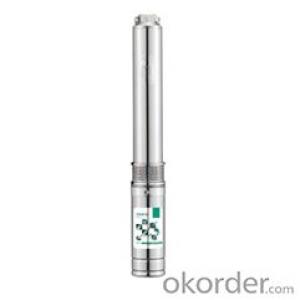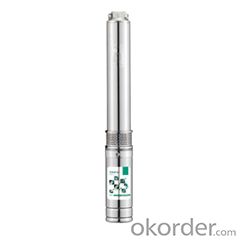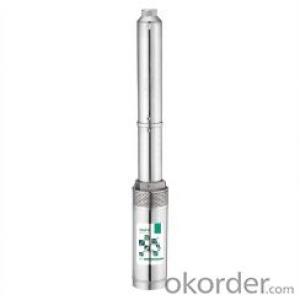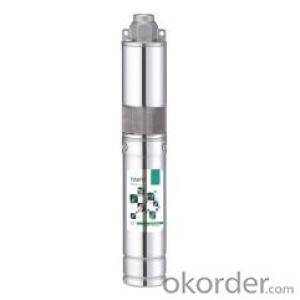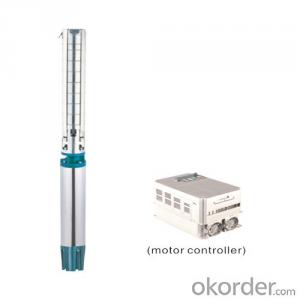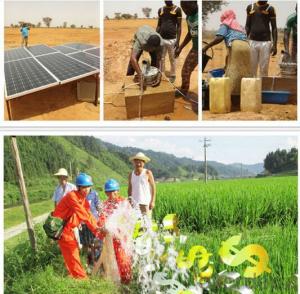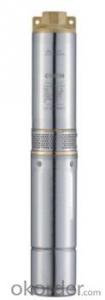4tsc Solar Pump Stainless Steel CE, Solar Panel - Solar Pump BP200
- Loading Port:
- Shanghai
- Payment Terms:
- TT OR LC
- Min Order Qty:
- 50 pc
- Supply Capability:
- 100000 pc/month
OKorder Service Pledge
OKorder Financial Service
You Might Also Like
1.APPLICATION AREA:This project products are mainly used in dry region for irrigation of agriculture, It can be used for drinking water and
living water. The living condition could be much improved. It also can be used for fountains.2.MATERIAL OF PARTS:Outlet: stainless steel
Pump body: stainless steel
Motor body: stainless steel
Bearing: C&U
3.ADVANCED TECHNOLOGY:1.Application innovation
Compared with the traditional alternating current machine, the efficiency is improved 25% by the permanent magnetism, direct current, brushless, non-sensor motor.
2.Technics innovation
Adopt double plastic package for rotor and stator, motor insulation≥300MΩ, the motor security was much improved.
3.Structure innovation
Oil filling, convenient installation and environmental protection4.HIGHLIGHTSa.Energy-saving and environment-protected green products
b.High technique products adopting MPPT and DSP chip technique.
c.100% copper wire, cold-rolled silicon steel sheet
d.CE certificate
e.Advanced three phase brushless DC motor
f.Stainless steel 316 screws
g.3 years warranty5.PRINCIPLE OF OPERATION:Solar panel collects sunlight→DC electricity energy → solar controller(rectification,stabilization,amplification,filtering)→available DC electricity→(charge the batteries)→pumping water6.ADVANTAGES OF SOLAR PUMP SYSTEM:A.It is easier and more widely used than any other dynamoelectric driven pumps.
B.It is more economical and more environmentally friendly.7.MODEL SELECTION:a.The power of solar panel = power of pump ×1.3
The voltage of solar panel = the voltage of pump
The controller should be matched
b.Select the batteries according to the following formulas:
The use hour of battery =
The battery capacity ÷(the machine power÷the battery voltage)×0.6 For example,the machine power is 200W, the battery
capacity is 100AH,the voltage is 12V,and the battery is fully charged,then the use hour is:100÷(200÷12)×0.6=3.6hours
c.The battery capacity=
the use hour ÷0.6×(the machine power÷the battery voltage) For example,the machine power is 200W,the battery voltage
is 12V,and the battery need to be used for 3.6hours,then the battery capacity is:3.6÷0.6×(200÷12)=100AH
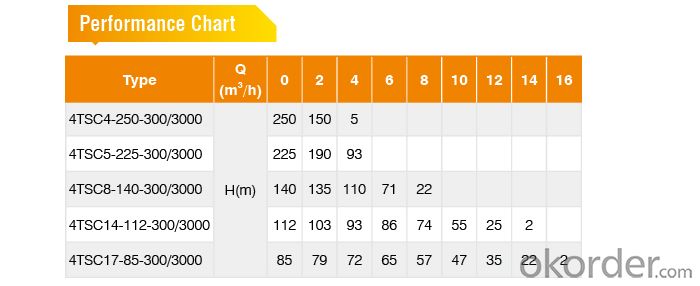

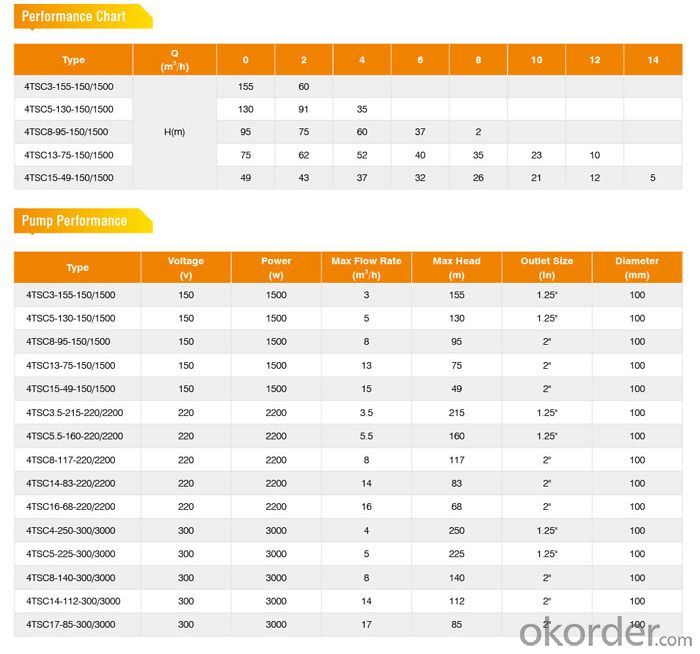
- Q: Can a solar pump be used for emergency water supply?
- Yes, a solar pump can be used for emergency water supply. Solar pumps use solar energy to power the pumping mechanism, which means they do not rely on electricity or fuel, making them ideal for emergency situations where power may be limited or unavailable. They can be used to extract water from wells, rivers, or any other water source, providing a reliable and sustainable solution for emergency water supply needs.
- Q: Can a solar pump be used for water circulation in a hot tub or spa?
- Yes, a solar pump can be used for water circulation in a hot tub or spa. Solar pumps are designed to circulate water using energy from the sun, making them an eco-friendly and cost-effective option. They can effectively circulate and filter water in a hot tub or spa, ensuring proper circulation and maintaining water quality.
- Q: Are there any limitations to the type of water a solar pump can handle?
- Yes, there are some limitations to the type of water a solar pump can handle. Solar pumps are designed to handle clean and clear water sources such as rivers, lakes, or wells. They may encounter difficulties with water that contains high levels of sediment, debris, or contaminants. Additionally, the performance of a solar pump may be affected by water with high acidity or alkalinity levels, extreme temperatures, or excessive salinity. It is important to consider these factors when selecting a solar pump for a specific water source.
- Q: Can a solar pump be used for water supply in off-grid military bases?
- Indeed, water supply in off-grid military bases can be facilitated through the use of solar pumps. These pumps present themselves as a sustainable and cost-effective alternative for remote locations where traditional electricity is not easily accessible. By harnessing solar energy through photovoltaic panels, these pumps are able to convert sunlight into electricity, which is then utilized to operate the pump that draws water from a well or other water source, subsequently supplying it to the base. Solar pumps boast numerous advantages for off-grid military bases. To begin with, they operate independently from the power grid, eliminating the necessity for expensive and regularly maintained fuel or diesel generators. Consequently, solar pumps are more reliable and self-sustaining, diminishing the logistical challenges associated with fuel supply in remote areas. Additionally, in comparison to conventional pumps, solar pumps have a reduced environmental impact. They do not release greenhouse gas emissions or generate noise pollution, making them an ideal choice for military bases that prioritize sustainability and minimizing their ecological footprint. Furthermore, solar pumps can be effortlessly installed and operated in various terrains. They necessitate minimal maintenance and possess a prolonged lifespan, guaranteeing a consistent and dependable water supply for military personnel stationed in off-grid regions. In conclusion, solar pumps are a feasible option for fulfilling water supply requirements in off-grid military bases. They offer a sustainable and cost-effective solution, operate independently from the power grid, have a diminished environmental impact, and are simple to install and maintain.
- Q: Can a solar pump be used in areas with limited access to backup battery systems?
- Yes, a solar pump can be used in areas with limited access to backup battery systems. Solar pumps work by converting sunlight into electricity to power the pump, eliminating the need for a backup battery system. This makes them ideal for remote or off-grid locations where access to reliable electricity or backup battery systems may be limited.
- Q: Can a solar pump be used for water supply in agricultural or farming operations?
- Yes, a solar pump can be used for water supply in agricultural or farming operations. Solar pumps are an environmentally friendly and cost-effective solution for pumping water in remote areas where grid electricity is not available. They can be used for various agricultural activities such as irrigation, livestock watering, and crop spraying, helping farmers reduce their dependence on traditional energy sources and improve overall efficiency. Additionally, solar pumps can harness renewable energy from the sun, making them a sustainable choice for water supply in agricultural or farming operations.
- Q: Can a solar pump be used in saltwater?
- Yes, a solar pump can be used in saltwater. However, it is important to choose a pump that is specifically designed for saltwater applications to ensure durability and prevent corrosion.
- Q: Can a solar pump be used in conjunction with a storage system?
- Yes, a solar pump can be used in conjunction with a storage system. In fact, combining a solar pump with a storage system can offer several benefits. A storage system allows excess energy generated by the solar panels to be stored for later use, which can be particularly useful during periods of low sunlight or at night when the solar panels are not actively generating power. By connecting the solar pump to the storage system, the excess energy can be used to power the pump even when the sun is not shining. This ensures a continuous water supply, regardless of the time of day or weather conditions. Additionally, using a storage system with a solar pump can also help reduce the reliance on grid electricity, making it a more sustainable and cost-effective solution for water pumping needs.
- Q: How does the programming and control system of a solar pump work?
- The programming and control system of a solar pump works by utilizing sensors, controllers, and software algorithms to manage the operation of the pump. The system monitors various parameters such as water level, pump performance, and solar irradiance. It then adjusts the pump speed and power consumption accordingly to optimize efficiency and ensure a reliable water supply. The control system also incorporates safety features and fault detection mechanisms to protect the pump and prevent any damage. Overall, the programming and control system of a solar pump enables intelligent and automated operation, maximizing the utilization of solar energy and ensuring efficient water pumping.
- Q: What is the average lifespan of a solar pump controller?
- The average lifespan of a solar pump controller can vary depending on various factors such as quality, usage, maintenance, and environmental conditions. However, a well-maintained and high-quality solar pump controller can typically last anywhere from 10 to 15 years.
Send your message to us
4tsc Solar Pump Stainless Steel CE, Solar Panel - Solar Pump BP200
- Loading Port:
- Shanghai
- Payment Terms:
- TT OR LC
- Min Order Qty:
- 50 pc
- Supply Capability:
- 100000 pc/month
OKorder Service Pledge
OKorder Financial Service
Similar products
Hot products
Hot Searches
Related keywords
